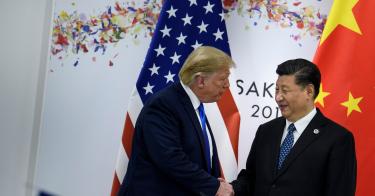The battle over human rights and values is raging in Asia, particularly in China. With more than one million Uighur Muslims in political re-education facilities, religious persons of all stripes facing persecution, and mounting evidence that China is exporting its surveillance technology to countries across the globe, human rights violations in the region are on the rise.
Against this backdrop, the Trump administration inaugurated its free and open Indo-Pacific strategy, which commits the U.S. to long-term security, economic, and values-based engagement with allies, friends and adversaries in Asia. While the security and (to-some-extent) economic aspects of the strategy have taken shape, the values component lags behind.
The Indo-Pacific strategy also juxtaposes U.S. strategy in the region against the rise of an increasingly-authoritarian China. As I outline in this recent paper for The Heritage Foundation, the Chinese government’s treatment of the Uighurs in many ways mirrors the Cultural Revolution. Terms like collectivization, reeducation, and de-extremification are all phrases borrowed from the Mao-era and practices, copied and pasted from his time as Chairman.
Vice President Mike Pence in a November 2018 op-ed for the Washington Post was clear:
[T]he Indo-Pacific strategy] support[s] transparent and responsive government, the rule of law and the protection of individual rights, including religious freedom. Nations that empower their citizens, nurture civil society, fight corruption and guard their sovereignty are stronger homes for their people and better partners for the United States…Authoritarianism and aggression have no place in the Indo–Pacific region.”
The Vice President’s statements are unequivocal. There should be no room for authoritarianism in the Indo-Pacific.
Yet, just last week, the Wall Street Journal reported that the White House issued guidance to senior officials to lay off support for protests in Hong Kong due to ongoing trade negotiations with China, and President Trump himself suggested the U.S. had no business commenting on the current situation there. These developments came on the heels of a series of missed opportunities to condemn China for its human rights violations, including the failure to sanction even a single Chinese official over human rights violations ongoing in Xinjiang.
By the same token, it would be a mistake to weaponize human rights. The U.S. government plays into the Chinese government’s hand when it refrains from raising concerns over human rights in order to accomplish other political objectives, like making progress in the trade war.
The converse is also true; the U.S. shouldn’t only issue harsh condemnations when it is serves other geopolitical objectives. Although criticism of human rights can advance other policy goals, to condition action on their presence minimizes the strategic value of human rights and needlessly reduces values to a utilitarian means to an end.
Historically, the promotion of human rights in Asia has set the U.S. apart from other actors in the region. Some might argue that this makes engagement from other countries in the region with China more palatable – so-called no-strings-attached investment, after all, may be more appealing to other bad actors in Asia.
Countries in Asia are waking up to the reality that – despite claims to the contrary – there are strings attached when engaging with China, strings that primarily benefit China and not them.
For example, most of China’s infrastructure investment projects throughout the region employ Chinese firms and workers rather than serving as an economic boon to local populations. Chinese companies are also benefitting from new customers in governments that, unbeknownst to their citizens, are purchasing surveillance technology from Chinese firms, to deploy for the purposes of monitoring their citizens. This breeds new violations of civil liberties worldwide.
Rather than back away from criticizing China’s human rights violations, the U.S. should lean into it – seeing it as a part of a broader strategy of promoting freedom in Asia and the world.
This piece originally appeared in Forbes https://www.forbes.com/sites/oliviaenos/2019/08/06/the-administration-should-be-bold-in-condemning-human-rights-abuses-in-china/#25c515706352



